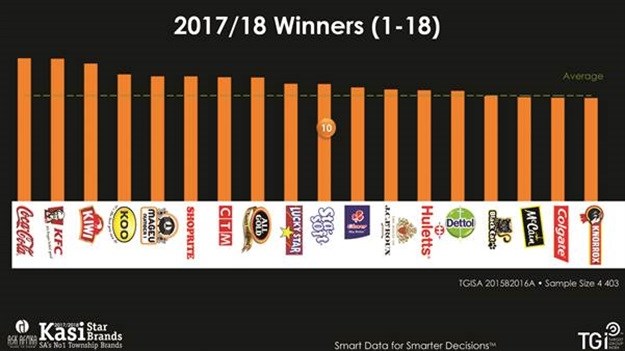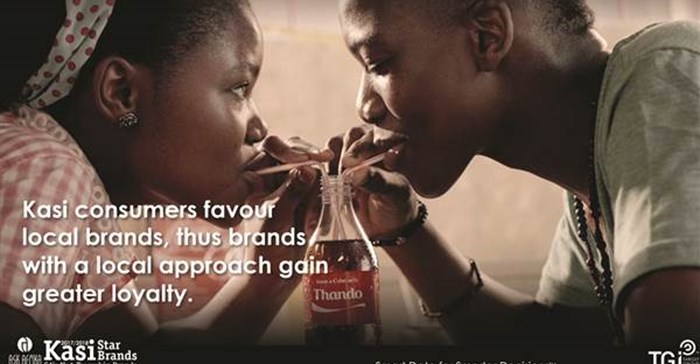The overall 2017/2018 Kasi Star Brands winner and favourite township brand is Coca-Cola, with KFC in second place, Kiwi shoe polish third, Koo beans fourth and Mageu No 1 fifth. Coca-Cola has been the top township brand for two years running.
Ask Afrika Kasi Star Brands are defined as brands that are used most loyally by South African township consumers. These brands encapsulate a common experience and Kasi consumers are committed to them. The Ask Afrika Kasi Star Brands benchmark is a powerful tool for brand owners to measure return on investment (ROI) in the township market.
The researchers conducted a comprehensive nationwide survey with a sample that is representative of the township population comparing brand usage across 144 product categories and ranking 2,996 brands.
The 36 Ask Afrika Kasi Star Brands 2017/2018 are:


The Kasi market largely remains a price sensitive market. Its consumers are excellent with budgets and they are receptive to special offers. They live in an unreliable and in many cases an unsafe environment, an investment in high quality brands provides a sense of reliability and assurance to the Kasi household.
The top line trends of the Ask Afrika Kasi Star Brands survey reveal a number of loyalty drivers that brand owners and marketers should bear in mind when targeting this market.
Overall, Kasi consumers spend money more carefully than they used to and say that it is worth spending more money for quality goods. The Kasi shoppers always look out for special offers, but if they like a product, they will buy it regardless of price. They are open to trying new brands to see if they like the product, but once they find a brand that they like, they tend to stick to it. Kasi consumers however, will try out a different brand if it is on special offer.
An investment in brands is seen as a ‘cheap price’ for aspiration. It is important for Kasi consumers that they care for themselves and the people in their household by giving them the best their money can buy.
“Kasi consumers expect quality and usually have a brand repertoire within their loyalty spectrum, which they will compare in terms of price points and special offers. They understand the advantage of choice and will choose the best their money can buy. If a brand consistently delivers quality at the right price point, it will be used by Kasi households,” says Dr Amelia Richards, account director at Ask Afrika.
Coca-Cola, the international giant, is continuing to enable a customised approach for its brand. The ability of a global brand such as Coke to merge local vernacular with a personal intimate occasion between two potential lovers, is the ideal recipe for loyal consumption of Coca-Cola to celebrate special moments.

Kasi consumers are proudly South African and opt to buy goods that are produced locally, believing that South African products are usually of high quality. They think that it is important that brands act ethically and refuse to buy products from a company that they disapprove of. Kasi consumers support brands that empower previously disadvantaged South Africans.
“The Target Group Index (TGI) data has shown that Kasi consumers are very loyal to South African heritage. Tradition and community is important in the Kasi where people take care of one other. They expect the same from brands that they pay money for,” says Richards. “There is a misconception amongst those that don’t know the market that when Kasi consumers become more affluent they become westernised.”
According to GG Alcock, this is not the case, greater affluence does contribute to modernisation, yet township residents often stay close to their cultural and local South African heritage – they become Afropolitan. Brands that want to be successful in this space must first understand the culture and then contribute towards it in a meaningful way.
“eKasi was once a swear word, a place to be feared, but is now a place where life is shared with brands and people that inspire hope, celebrate a multitude of entrepreneurs, community leaders, responsible proactive citizens of both the Kasi and the Emalalini, the rural villages.” (GG Alcock 2015)
Living and doing business in African market places require an ethos and connection to the informal, invisible and intangible. It is vital that marketers targeting this market have an in-depth understanding of this continually changing environment and lifestyle. It is important to talk to aspiration, yet to remain within reach. Many Kasi consumers travel into the cities for work and see the way that brands are being advertised there. It is vital not to denigrate the Kasi consumer through inconsistent brand messaging and tone of voice in cities versus townships.
Brands that share what they achieve in empowering and uplifting disadvantaged communities through their CSI initiatives will garner loyalty from the Kasi consumer.
Not only did the KFC ‘Add Hope’ campaign feed 5 million children during World Hunger month, but it feeds 110,000 children every day. In 2016, the KFC initiative included the unveiling of the wall mural on Vilakazi Street in Soweto, increasing awareness for the campaign. The residents can collect seeds from the tree mural on the wall encouraging them to grow their own vegetables and fruit.
“Brands that connect and identify with the language, the culture and local style will win over the hearts of Kasi consumers. Respect is inherent in the Kasi culture as are ethics, caring for the past and present, hope and a belief that we will all build a better future, as a collective – brands are expected to be part of this ethos,” concludes Richards.